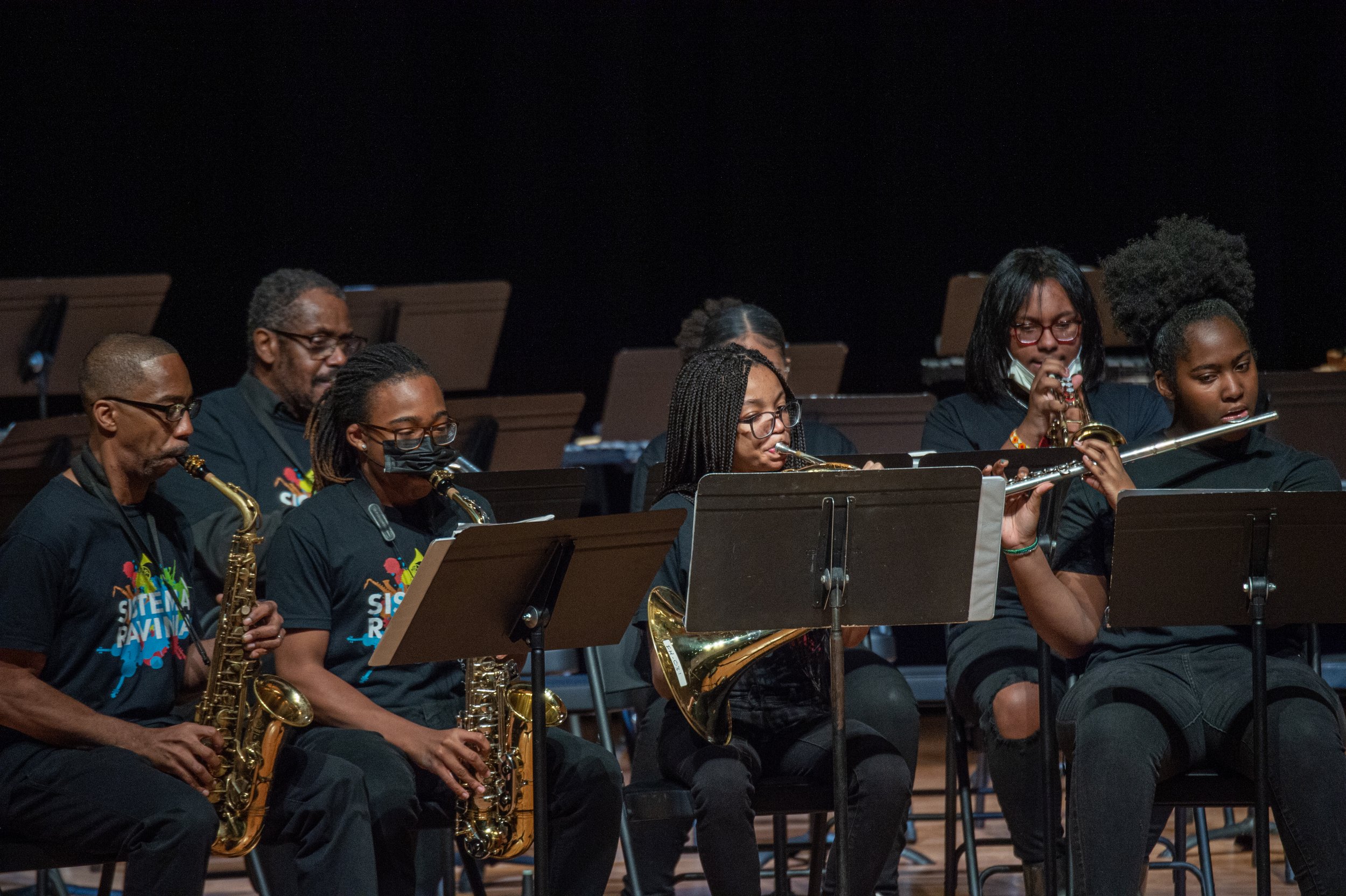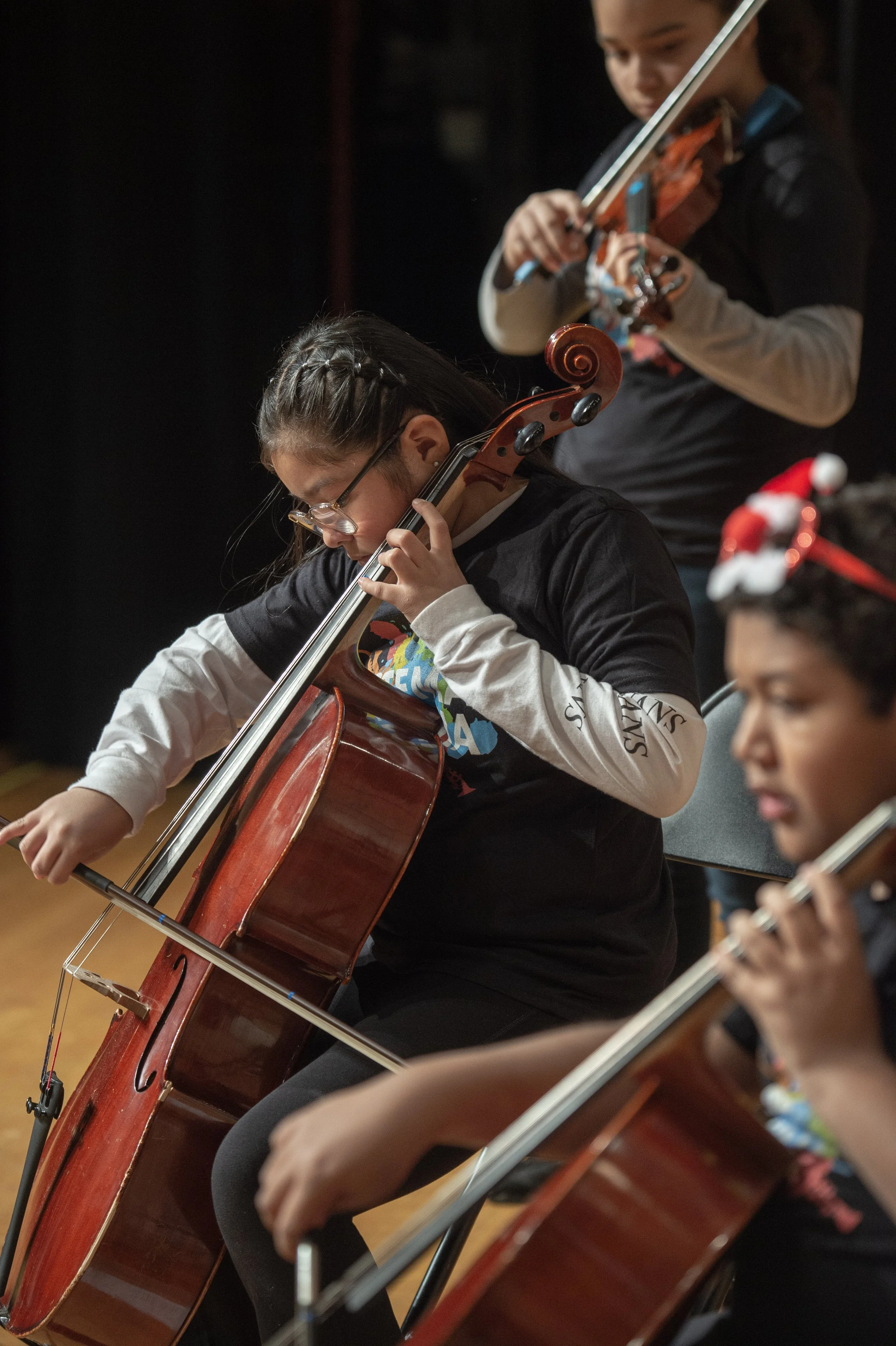Orchestra’s For All
By Kyle MacMillan
Given the country’s historical ties to such celebrated composers as Wolfgang Mozart and Franz Schubert, it’s hardly surprising that music education is compulsory in Austrian schools from 1st through 10th grades.
But one of the most innovative and acclaimed such programs in the world emerged thousands of miles away in a seemingly unlikely country with much less connection to the traditional canon of classical music—Venezuela. Known as El Sistema (literally, The System), it had involved more than 700,000 student musicians by 2015, including perhaps its most famous alumnus, Gustavo Dudamel, who will take over as music director of the New York Philharmonic in 2026, as well as the San Diego Symphony’s Rafael Payare.
Although El Sistema has drawn some criticism since it was founded in 1975, it has garnered worldwide recognition and spread to nearly 80 other countries, including the United States, where there are 140 instrumental-music programs inspired by its success. One of the largest is Sistema Ravinia, which is in its 10th year of serving 250 primarily Black and Latino elementary- and middle-school children in Waukegan and the Austin and Lawndale neighborhoods of Chicago.
Sistema students regularly rehearse and perform with their instructors as part of their ensemble. Chicago Philharmonic musicians will be in residence all four days of the Seminario to be mentors to the 130 young people and play side-by-side with them during the final concert.
To celebrate the rise of Sistema music education in the United States and help spur even more growth, the Ravinia Festival is teaming with Chicago Philharmonic to present the first-ever National Seminario from July 5 through 8. The event will bring together 130 students from 23 Sistema-style initiatives across the country and Canada to participate in intensive orchestral training and to present a culminating concert on the Pavilion stage as part of Ravinia’s Kids Concert Series.
“I think it’s going to be a great thing for these students to see that there is someone on the other side of the country who has the same interests as them or who is playing the same instrument as them and who wants to partake in the same experience together,” said conductor Jonathan Rush, who is leading the rehearsals and final concert along with his mentor, Marin Alsop, Ravinia’s chief conductor.
Carlos Astudillo, an 8th-grader at John R. Lewis Middle School in Waukegan and a budding baritone saxophonist, is looking forward to being able to interact with other musicians like him at the Seminario. “It could really help me with my people ability and [allow me to] meet more sax players and learn a thing or two from them,” he said.
Several Sistema Ravinia students from across its three nucleos—one each centered on Austin and Lawndale in Chicago and one spanning Lake County schools—are participating in the National Seminario, including baritone saxophonist Carlos Astudillo (above), and are looking forward to the camaraderie that will come from meeting, learning, and making music alongside like-minded young people, fulfilling the social change and growth aims of such programs inspired by Venezuela’s El Sistema.
Sistema Ravinia falls under the auspices of Ravinia’s Reach Teach Play, a multifaceted portfolio of education and community engagement programs that operate in large part behind the scenes and don’t typically get the same public attention as the festival’s high-profile summer concert schedule. It involves 20,000 public-school students annually and touches some 30,000 other people through such initiatives as free concert passes for underprivileged groups. “What we do is all about creating a continuum of a deepening relationship to music and a deepening relationship to Ravinia,” said Director Christine Taylor Conda, who is marking her 21st year at Ravinia in July.
Begun at the Catalyst Circle Rock Charter School in Austin, where Reach Teach Play already had a relationship, Sistema Ravinia later added two other “nucleos” (music centers) for a total of 13 participating schools in all. The students, who take part in the free program with donated instruments provided at no cost, attend four afterschool sessions each week.
“Sistema is the most intensive, concentrated and high-investment way that we have to bring real music training to hundreds of kids,” Taylor Conda said. Some of its participants have gone on to study at Chicago’s Merit School of Music and take part in the Chicago Musical Pathways Initiative, a competitive program which provides private instruction and summer intensives and other aids toward helping underserved students obtain a place at prominent music schools.
But the Ravinia program has broader goals than just producing prodigious musicians. El Sistema in Venezuela carries the motto “Music for social change,” and it functions not under the ministry of culture but the country’s social-service ministries. Similarly, Taylor Conda, who served for three years as a board chair of El Sistema USA, calls Sistema Ravinia a “social-change program” with music as the vehicle.
According to conductor Raimundo Pineda, artistic manager of Ravinia Sistema Lake County, the program teaches extra-musical values like solidarity and teamwork, with each individual playing an integral role in an orchestra just as he or she can in society. “Our idea is that if you are a good musician, maybe you could be a good citizen,” he said. Pineda is a Venezuelan immigrant who was part of the first generation of alumni of El Sistema. In addition to his teaching, he is a noted flutist and composer—the music the National Seminario students will be working on includes a piece he wrote specially for the occasion.
Jonathan Rush—a protégé of Ravinia Chief Conductor Marin Alsop and Chicago Sinfonietta Music Director Mei-Ann Chen, and himself artistic director of the Baltimore Youth Symphony Orchestra—has twice been a guest mentor for Sistema Ravinia students while visiting to conduct summer concerts and will now help inspire an even wider group of budding musicians, leading not only their rehearsals and performance but also professional development for their instructors.
Alsop and others at Ravinia were looking for a way to broaden the reach of Sistema Ravinia, and Isaac Sinnett, Reach Teach Play’s senior associate director and also an El Sistema USA board member, conceived the idea for the National Seminario, and he is overseeing the undertaking. “How could we be that space for students who might not otherwise have this opportunity to come together with students with backgrounds like theirs to work with Chicago Philharmonic musicians and be led by someone as renowned as Marin Alsop?” he said.
“It’s going to be a great thing for these students to see that there is someone on the other side of the country who has the same interests, who is playing the same instrument, and who wants to partake in the same experience together.”
Before the final concert on July 8, the participating students will take part in three days of morning-to-evening activities, including rehearsals of Maurice Ravel’s famed Boléro and three other selections with 38 Chicago Philharmonic members and sectional practices with 25 mentors from the orchestra. “It really is intense,” Sinnett said. “It’s intense from a music-making standpoint, and it’s intense from a social, community-building aspect.”
Rush, who spent 2018–19 on staff at the Chicago Sinfonietta and now serves as both associate conductor of the Baltimore Symphony Orchestra and artistic director of its youth orchestra, felt compelled to take part in the National Seminario as a Black conductor. “My artistic mission,” he said, “is to inspire that next generation of young creators and musicians who look like me, because I didn’t really have it at a younger age. When I look at this El Sistema program, I see a lot of students who are underrepresented or unrepresented, really, inside of the field of classical music, and I think this is perfect opportunity for me to be that example for them, to let them know that if this is a career you want to take on, it’s absolutely possible.”
Most of the Seminario activities will take place on the Ravinia campus, but the students will be staying in the dorms at nearby Lake Forest College, where they will also have some rehearsals. “Even for some of our own students, this is going to be the first time they have stayed away from home,” Sinnett said, “so it’s a big deal, and it’s a big opportunity, and I’m sure it’s scary in many ways and exciting in other ways.”
The big difference between the Seminario and many other high-profile summer music camps is that there are no required auditions. “I kind of saw this middle ground,” Sinnett said, “where there was this big group of students who weren’t having opportunities, because maybe they weren’t ready to audition into an experience like that or maybe some students just aren’t good auditioners.”
Instead, Sistema Ravinia sent invitations to the El Sistema-inspired organizations in the United States and Canada asking them to nominate up to 10 students for the Seminario, and 23 groups responded. “Part of the idea of the non-audition,” Sinnett said, “is that the organizations know their students better than we could through an audition. They know which students could receive the greatest impact through this type of experience.”
Sinnett and others then set up Zoom calls with officials from each organization to discuss their submissions and Ravinia’s eventual picks. A little fewer than half the students nominated were chosen, with an overriding goal to make sure there was a balanced number of musicians across all the sections of the Seminario ensemble. “We joked that we were trying to avoid an orchestra of 47 flutes, 97 violins, a piccolo, and a string bass,” Sinnett said.
Another of the Chicago-area students participating is Rafaela Palencia, an 8th-grader at Edith Smith Middle School in Waukegan who is a big fan of the cello. “I like the sound it has,” the young instrumentalist said. “Whenever I play it, I can feel it vibrating with me. It makes my body want to move.” She believes the event will help her decide if she wants to make music her career.
Conductor and composer Raimundo Pineda led a Sistema Ravinia student string ensemble at a 10th anniversary concert in May on Ravinia’s Pavilion stage, where students from across the United States and Canada will converge on July 8 for the culminating concert of National Seminario Ravinia with conductors Marin Alsop and Jonathan Rush.
With help from the event’s presenting sponsor, the Chicago-based Ralla Klepak Foundation for Education in the Performing Arts, Ravinia is already committed to presenting the National Seminario in 2024. But after that, Sinnett hopes it will become a biennial rather than annual event. “It’s such a massive project, and it’s so complex with so many logistical layers to it,” he said. “I think also it can be really challenging to keep the momentum going on an annual basis, so we’re hoping to give the programs and students some breath to plan.” ■
Kyle MacMillan served as classical music critic for the Denver Post from 2000 through 2011. He currently freelances in Chicago, writing for such publications and websites as the Chicago Sun-Times, Early Music America, Opera News, and Classical Voice of North America.








